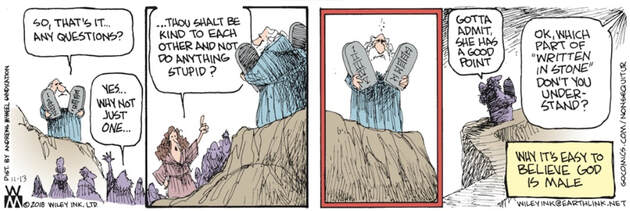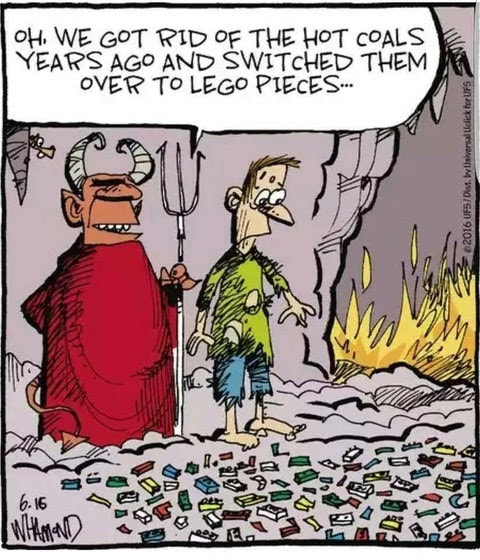Still, I do see the value of a "church" as a social institution. After all, a group of folks gathered together to build social connections and engage in "good" works seems like it certainly ought to have some uses. I have also always thought that anyone with any pretensions to rationality ought to give some thought as to the fundamental questions which Humankind has been pondering for as long as there have been humans, like: "Where did we come from?; Why are we here?; Why do some of us look different from others?; Is there a purpose to our existence?; Which is the TRUE God, or is there one?; etc." An obvious corollary to those questions, at least for me, is "Since ALL major religions seem to value the ideas of peace, forgiveness, love, doing good, etc., why have most wars throughout history been fought, to some extent, over which religion is "correct?"
I have not found ANY even remotely plausible response to that, last, question. Nor do I feel that I have come to any sort of answer to the others posed above which I feel confident enough about so as to suggest that others should accept MY conclusions as their own. Science seems to offer some possible explanations for some of them, but those answers are just the most factual we have, subject to new data, sort of like much of our "knowledge" of the novel coronavirus and COVID-19, as well as a good many other things.
I think that's why I had a moment of pure glee when I attended a local production of the Reduced Shakespeare Company's The Ultimate Christmas Show (Abridged) a couple of years ago. Now, I will confess that I was not overly enthralled with the script, or the local performance, but the idea of the traditional church-based Christmas show (pageant) going awry was quite amusing to me as a theatre person. And, I was reminded of the fact that I actually took part in such activities as a teenager for several years in my church a long time ago, so I could identify with the general nature of the experience. I will also confess that having the church sponsoring this "ultimate" Christmas show being "St. Everybody’s Non-Denominational Universalist Church, where all faiths are welcome because we’ll believe anything" was, I thought, quite amusing. I decided that I wished it really existed and that, if it actually did, I would join up as quickly as I could.
I'm still looking for my local congregation, but I have hopes of finding it, because I do think that I believe in religious-oriented beliefs: i.e. being kind to one another; treating your neighbor as you would like to be treated; peace and love are preferable to war and hate; etc., which seem to be universal enough concepts to fit right in. My problem with religion is accepting the notion that any ONE religion has a monopoly on such principles, or on the having access to the "true" Word of God.
I do wonder why it seems to be so important for EACH religion to establish that only IT has all of the CORRECT answers and that every other "religion" (even the ones which we accept as not awful) doesn't really understand that only WE can properly be considered the TRUE believers. Could it be something as simple as the answer proposed by Non Sequitur? Is it just that God is male, and that complicates things? I confess that I rather like this gal's idea.
On the other hand, I like to think of myself as a reasonably "good" person who has rarely, if ever, gone out of his way to hurt someone else (physically or emotionally). I may have done so, but I don't think that was my conscious intent. I've also not tried to set myself up as the arbiter of what is good, or evil, for other people, although I do try to do what I consider to be "good," rather than "evil," and, thereby, demonstrate what I would consider to be a reasonably good example for others. What I mostly desire is to be left alone to have my own belief system and to let you have yours. What annoys me the most is people setting themselves up as role models when they are quite clearly NOT practicing the religious principles which they say they wish to use to judge my behavior.
I think I read something about "Judge not, lest ye be judged." somewhere. Actually, I think it was Matt. 7, 1 in what is called the Bible. There may be similar texts in other religious books, probably are, but I can't cite them. I am also frequently annoyed by the "holier than thou" attitude of some regular church goers, who worry more about making the proper social impression within their church community than they do about practicing the basic tenets of their professed religion. As I heard one religious leader say on TV not long ago after his church building was destroyed by a storm, "A building is not fundamental to religion." I am also particularly fond of Matt. 6, 6 which would seem to suggest that the whole idea of churches packed with worshippers may be good for the sake of social appearance but might not be the most productive way for a real Christian to satisfy a desire for meaningful prayer.
Again, Non Sequitur has suggested an idea which might be useful to think about.
I suppose that I might also point out that, while I have nothing against Easter, like so many other "Christian" holidays, it is also, at least in part, an adaptation of other religious traditions. After all, Jesus and the disciples went to Jerusalem to celebrate Passover. That means that what Christians call "the Last Supper" was (and is biblically described as) a Passover Seder. After all, Jesus thought of himself as Jewish.
But the roots of Easter go back further and along a number of different paths. The Greeks and Romans had a variety of spring-related seasonal renewal beliefs and ceremonies, and there were ceremonies, rites, and rituals to various goddesses of Spring (one of whom was named Eostre) in much of Europe long before any real penetration of Middle Eastern religion and, since spring has always been a time of rebirth, fertility rituals, such as May Day and Beltane also fit into the pattern of non-Christian religious occasions which are traditional at this, general time of year. So, we have yet another example of Christianity "adopting/adapting" traditions from other religions for its use.
What's my point? Just that, as far as I'm concerned, one is welcome to believe what they wish, but that I, for one, get VERY concerned and upset when people set out to demand that their beliefs are the only ones which should be given any sanction. Now, I have never heard a discussion relating to these sorts of ideas which didn't, ultimately, boil down to "This is what I believe because the god I believe in says that I should do so!" Need I point out that this is not a proof! What it DOES prove is that someone is incapable of considering the POSSIBILITY that their beliefs are NOT the final say on TRUTH just because those beliefs SAY they are.
We are talking about BELIEFs. Beliefs are NOT established facts. They are simply an explanation of a way to explain the fact of our existence, etc. They are not subject to question simply because they have no basis in fact. That's why they are beliefs! Personally, I have no problem with you believing in whatever you wish to. Just grant me the right to disagree. We can discuss our beliefs, or not, but, as long as I don't harm you through my beliefs, I don't think that you have a right to suppress mine. As Isaac Asimov, one of my favorite writers, has been quoted as saying; "To surrender to ignorance and call it God has always been premature and it remains premature today."
I still believe that there are questions worth asking, though I have doubts that we will ever find universally satisfactory answers to them in any religion, because all religions seem more worried about making sure that their ideas are dominant than they are about acquiring factually accurate information. Personally, I suspect that Science might produce better answers than religions, if for no reason than that ALL religions appear to keep trying to "prove" that science is wrong.
Do I have the answers? No, but I can live with that. I'm going to try to do my best to act in accordance with the ideas which I believe to be of value, and I'll let you worry about your behavior. What do I believe? I really can't put that down in a few words, although I think the idea that Theatre can contribute to the creation of a better world is probably in there somewhere. Perhaps that's why I like the idea of St. Everybody's.
Next time, I'll try to get out of the "pulpit" and talk a bit about something related to Shakespeare. After all, his Birth/Death Day approaches quite soon...
LLAP
Dr. B
P.S. Don't step on any bunnies, they might be leaving you Easter eggs. Of course, what they are leaving might be something else....




 RSS Feed
RSS Feed